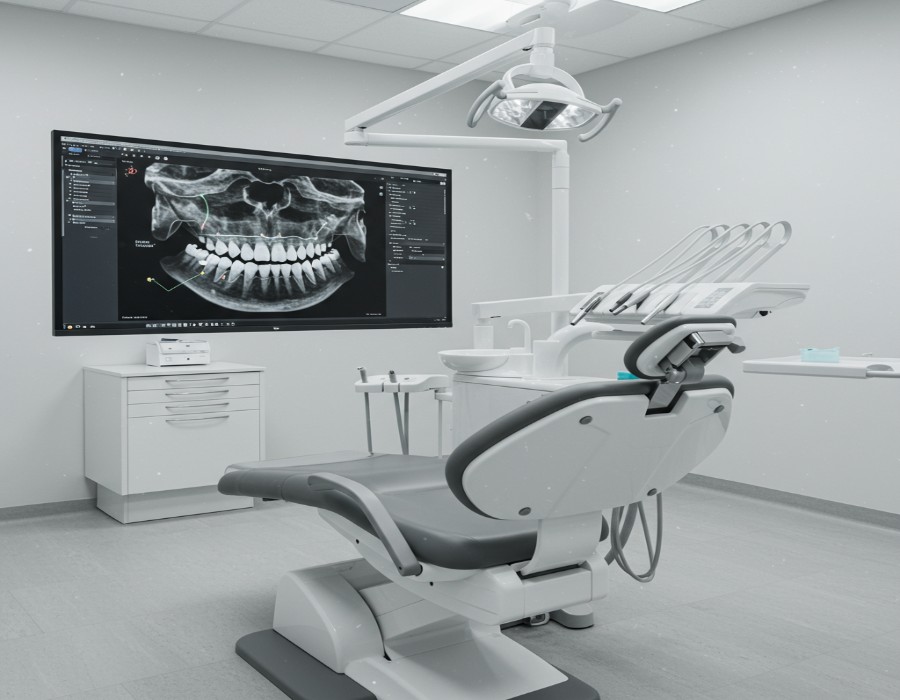

Artificial Intelligence is transforming dentistry through advanced AI application in dental practice. It improves diagnosis and simplifies workflows. This gives quicker, more accurate, and tailored patient care. The adoption of AI by the dental industry makes it more competitive. This article discusses AI's practical applications in dental clinics. AI automates clinical and administrative functions. The dental AI market globally is growing. AI assists dentists around the world in avoiding patient overload and diagnostic problems. AI solutions enhance results, cut costs, and boost patient satisfaction. AI tools efficiently scan radiographs and images.
AI is revolutionizing dental clinics. It takes care of clinical and administrative work. The dental AI market across the world is expanding. Applications vary from diagnostics to scheduling. AI presents dentists with an opportunity to overcome patient overload, inaccurate diagnosis, and ineffective practice management. AI-powered solutions enhance clinical results, lower expenses, and improve patient satisfaction.
AI-based diagnostic tools are able to effectively scan intraoral images and dental radiographs. A global study revealed that AI can analyze panoramic dental X-rays more accurately than experts, detecting certain issues with 67.9% greater sensitivity and processing images 79 times faster.
scanO's AI-based diagnostic functions facilitate quick and precise identification of dental conditions from radiographs, enhancing early intervention and treatment accuracy.
Predictive analytics software improves the accuracy of treatment planning in orthodontics and implantology.
Software such as Invisalign's ClinCheck applies AI to virtually simulate tooth movement so that personalized aligner treatment is feasible. Although dental websites are becoming more popular, using AI to plan accurate implant placement and orthodontic adjustments is on the rise.
AI can be utilized to manage administrative functions such as appointment scheduling, billing, and follow-up of patients. In the world of dentistry, the trend to implement AI for practice management is increasing, as dental clinics wish to minimize the burden of workload on staff and avoid the risk of human error. Chatbots and CRM software with AI capabilities can deal with repetitive queries, freeing dental staff to concentrate on clinical treatment.
Researchers are exploring the application of AI technology for surgical purposes, specifically for use with Cone Beam Computed Tomography (CBCT) scans. AI-enabled CBCT imaging provides high-resolution images of dental anatomy, which helps in the precise placement of implants and preoperative planning. AI technology may also help detect irregularities in CBCT scans that will enhance diagnostic accuracy in complex cases.
Artificial intelligence is revolutionizing the imaging methods with the ability to do critical analysis of dental structures.
AI-based CBCT imaging facilitates better oral pathology detection, i.e., more precise treatment choices. Using AI-powered imaging, scanO maximizes CBCT scans and intraoral evaluations, resulting in better visualizations for better clinical decision-making.
Technologies such as scanO are leading the way towards AI-supported individualized dental care, allowing for predictive analytics in customized treatment approaches.
Next-generation AI technologies will use patient data to predict oral disease risk, offering individualized preventive measures. AI can assess genetic risk, everyday lifestyle factors, and clinical history to recommend individualized treatment protocols even before dental disorders develop.
AI chatbots will get more sophisticated, aiding in maintaining patients' oral health routine, appointment scheduling, and post-treatment guidance. Smart assistants with AI capabilities can aid in answering questions from patients and adopting an effective digital assistant system.
AI-researched stem cells bring self-healing capacity to teeth, minimizing the requirement for surgeries such as those being performed with conventional fillings and implants. For example, AI-generated technology in this area can also help in the regeneration of enamel and dentin.
Quantum computing would be able to accelerate the possibility of AI in dentistry to offer lightning-fast diagnostic and treatment simulations beyond existing machine learning levels. That may result in immediate disease prediction based on comprehensive patient histories.
Microscopic robots using AI would assist root canal treatment, eliminating infection with precision without harming healthy tissue. Such precision may transform endodontic treatment.
AI human brain neural network simulation can assist in forecasting tolerance to pain and generating hyper-personalized anesthesia protocols. Nerve cartography created through AI can also assist in developing non-invasive pain-relief treatments.
Epigenetic AI data analysis may enable dentists to forecast how the patient's environment and genes work out long term, providing lifetime dental health plans based on a person's DNA.
AI and AR can work together to provide real-time visual simulations, allowing dentists to show patients what their treatment results will look like before starting. This helps build patient confidence and allows better planning of procedures.
As AI continues to develop, it will evolve from basic support to smart, anticipatory guidance that improves decision-making while still keeping the important human touch in dental care. Dentists who use AI will be at the forefront of a new era of efficiency, accuracy, and better patient outcomes.
As AI continues to make its footprint in dentistry, ethically, patient confidentiality, data security, and autonomy of the clinician must be addressed. Diagnosis and treatment using AI will assume an increasingly critical role in managing in a way that maximizes transparency and trust.
The growing use of AI in dentistry will change the role of dental practitioners in the future. While AI can help with diagnosis and treatment planning, it cannot replace the dentist’s experience, judgment, manual skills, or ability to connect with patients. AI is a tool that helps make workflows smoother and handles data tasks, but it can’t make complex clinical decisions or build relationships with patients. Instead of replacing dentists, AI will support them by handling routine tasks, allowing dentists to focus more on important work that requires a personal, human touch.
Artificial intelligence is revolutionizing dentistry by providing technologies that improve diagnostics, make treatment planning simpler, and improve practice management. Dental practitioners who use AI in their clinics can expect major improvements in efficiency, accurate diagnoses, and patient satisfaction. Nowadays where dental practices are increasingly open to digital tools, AI offers a powerful way to improve both patient care and practice management. As technology advances, AI will help dentists provide personalized, evidence-based treatments that raise the standard of care.
scanO is an AI ecosystem transforming oral health for patients, dentists, corporates, and insurers worldwide

© 2025 Trismus Healthcare Technologies Pvt Ltd